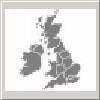Coleophora albitarsella - Distribution map
Please note that the NBN Gateway map service has been terminated as of 1 April 2017.
As soon as a replacement map service is available, distribution maps will hopefully appear here again.
In the meantime, you can get some idea of distribution from the NBN Atlas website.
37.032 BF515
Coleophora albitarsella
Zeller, 1849
Wingspan 10-13 mm.
This grey winged moth resembles several others in the genus Coleophora, but the white tarsus on each leg (hind two pairs only on female) is conspicuous on live specimens. More reliable identification depends on examination of the genitalia, or rearing from the distinctively cased larva. The adult flies at night, and sometimes in sunlight, from mid June to August throughout England and Wales and a few places in Scotland, in open and shady habitats where the foodplants occurs. It is scarcer in the North.
The larva prefers marjoram (Origanum vulgare) in southern England and Scotland, but seldom uses it on the continent, and totally rejects it in North Wales (MBGBI), though it has been found on marjoram in Montgomery in mid Wales. Other plants used include basil (Clinopodium vulgare), calamint (Calamintha), clary (Salvia horminoides), ground-ivy (Glechoma hederacea), mints (Mentha spp.) and self-heal (Prunella vulgaris). Plants in partial shade are preferred. The larva starts feeding and case making in August, overwinters half grown, recommences feeding in early March and is full-grown, case 9 mm, in May. Blotch mines reaching the edge of the leaf, initially pale green turning brownish white, are caused by the larva feeding on the underside of a leaf.
Pupation from May to early June is in the case, usually attached to a hard surface such as a rock or post.
Larva: (description Ian F. Smith)
Foodplant: Marjoram (Origanum vulgare). See main text for other plants.
Case: 9 mm full grown in May. Slightly flattened laterally. Dark brown, made of leaf and silk. Sparse yellowish hairs when made of O. vulgare. Hind end curved down with distinct yellowish keel. Light ventral gusset immediately after growth expansion.
Head: Light brown with dark adfrontal ridge.
Prothoracic shield: Translucent brown with dark brown posterior. Divided by thin light medial line.
Mesothorax (T2): Black shiny dorsal plate divided by light medial line.
Metathorax (T3): Oval black subdorsal sclerite.
Thoracic legs: Coloured as abdomen. Large black sclerite at base.
Body: Greyish yellow or greyish white. Anal plate present.

 UKMoths
UKMoths 





